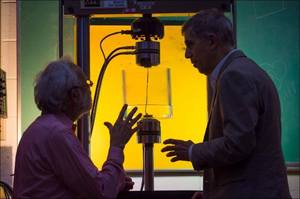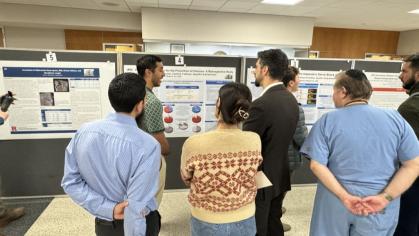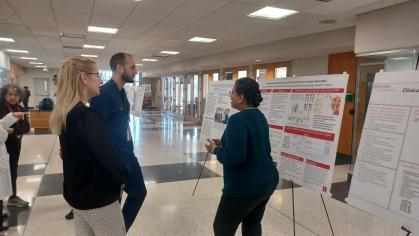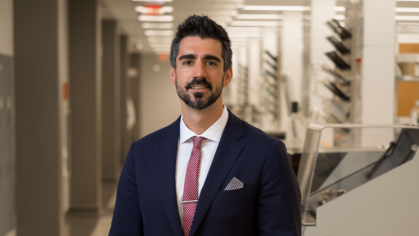All About the 'Chewing Machine'
 From left, Allyn Luke and Dr. Saul Weiner
From left, Allyn Luke and Dr. Saul Weiner
Allyn Luke oversees the “chewing machine,” a device that tests the hardiness of implant screws and dental materials by simulating real-life wear and tear.
The digitally controlled machine, one of only two in the nation, can chomp on specimens for as long as 11.6 days, or “six million cycles.” That can tell researchers whether a screw is likely to come loose or an amalgam filling has a greater potential to crack than another type of material.
Luke, a nationally known expert who has taught concrete design at New Jersey Institute of Technology (NJIT), came to RSDM in the 1990s as a volunteer. For more than 30 years, the civil engineer worked for the New Jersey Department of Transportation, researching and testing the state’s roads for safety. He believes he is the only person in the U.S. who has tested the strength of both a 1,000-foot highway and a dental bridge.
Because concrete and dental materials are similar—both are brittle, composite materials prone to crumbling—Luke is well suited to test both. The chewing machine, technically known as a biaxial, closed-loop, servo-hydraulic system, is the same kind of machine he used during more than 27 years of concrete research. It is associated with technology also used in the aerospace and automotive industries, says Luke. “It’s called ‘torque-angle analysis,’ ” he explains.
Luke has worked at RSDM since 1998, researching materials for the Department of Restorative Dentistry with help from Professor Saul Weiner. Since he began his research at RSDM, Luke, along with postgraduate restorative students, has focused much of his attention on implant screws, which often loosen after insertion, causing problems for patients. The team has discovered that short, fat screws tend to stay tightened longer than screws that are thinner and more elongated. They have published several peer-reviewed papers on their findings.
This year, the Restorative department received $60,000 in funding to upgrade the chewing machine’s 1990s technology with a new digital controller. Luke and Weiner will continue the research they began last year with the Rutgers School of Engineering. “We’re working on a new generation of dental materials that are more durable, less expensive, and easier to make,” Luke says.



